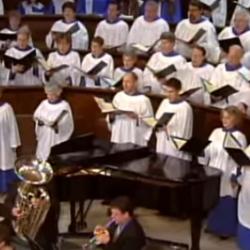And the problem is particularly acute in Europe. Details:
In the mid-19th century, organists knew where they stood — and it was at the top of the musical pecking order, thanks to their association with the church, which mostly supplied their instruments. According to Ms. Ennis, their average earnings compared favorably with bank managers and other middle-class professionals. And the chief among them, with cathedral posts, could hope for more.
Now, all this has gone. With the decline in organized religion, parish organists earn token incomes — if the parish has an organist at all — and cathedral organists have suffered declines in influence and pay. Which explains why so many of the best relocate to America. John Scott — the former organist of St. Paul’s Cathedral in London, now at St. Thomas Episcopal on Fifth Avenue in New York — is a case in point.
Looking beyond Britain, the patterns of decline are mixed. In Germany a long-established system of church taxes may not provide the revenue it used to, as secularists increasingly opt out, but still raise enough to ensure that most parishes can employ musicians and give them a fair wage.
Historically, those taxes have also kept the organs themselves in good repair and kept in business 180 organ builders in Germany compared with a few in Britain, said Philipp Klais, who runs Orgelbau Klais, the celebrated Bonn-based organ builders. “But this too is changing,” he said, adding that private donors now pay for 90 percent of his work, largely because the church now prefers to spend money on social projects.
“Thankfully, the donors are there,” Mr. Klais said. “We are after all the nation of Bach, and people want to support the great organ tradition associated with him.”











